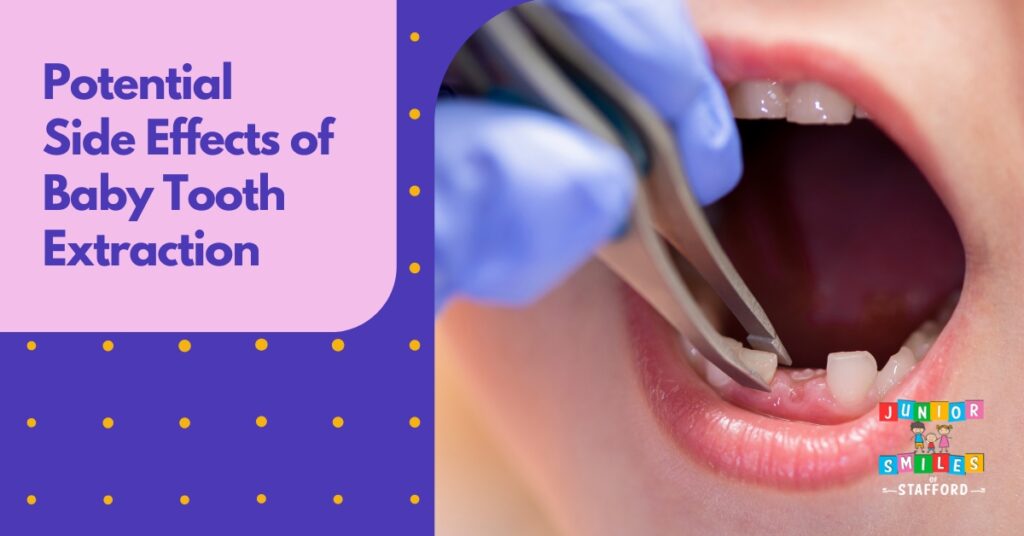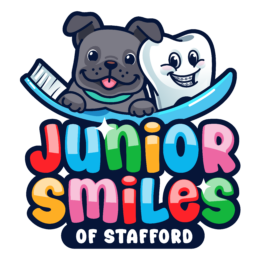Potential Side Effects of Baby Tooth Extraction

The transition from milk teeth to adult teeth is a natural and often exciting process for children and parents alike. However, sometimes primary teeth might need to be extracted due to decay, damage, or developmental reasons.
As parents, our children’s well-being is always at the forefront of our minds, especially when it comes to their health. One area that often raises concerns is dental care. While milk teeth are temporary, decisions surrounding them can have lasting implications.
Baby tooth extraction, though a common procedure, isn’t without its potential side effects. Before you embark on this dental journey, it’s essential to be equipped with comprehensive knowledge. In this blog post, we’ll delve into the potential side effects of baby tooth extraction, ensuring you’re well-informed and prepared for what lies ahead.
Does Baby Tooth Extraction Hurt?
It’s natural to worry about the discomfort your little one might feel during and after this procedure. However, understanding what goes into a baby tooth extraction can put those fears at ease.
Modern dental technology and practices have come a long way in ensuring comfort and minimizing pain during procedures, including pediatric tooth extraction. For one, your child’s pediatric dentist will typically use a local anesthetic to numb the area around the tooth that will be extracted. This means that your child may feel some pressure during the procedure, but should not feel pain. Moreover, experienced dentists specialize in treating children and are trained in techniques that are gentle yet effective. Utilizing the appropriate tools and methods, they aim to make the pediatric tooth extraction procedure as quick and painless as possible.
Potential Short-Term Side Effects of Baby Tooth Extraction
Immediately after the procedure, it’s not uncommon for the child to experience some localized swelling and mild pain around the extraction site. This is a natural response as the body begins its healing process. Additionally, some children might notice minor bleeding from the site, which usually subsides within a few hours. It’s also possible for your child to feel a bit groggy or drowsy, especially if sedation was used during the extraction.
Long-Term Consequences of Baby Tooth Extraction
One of the primary roles of temporary teeth is to serve as placeholders for the adult teeth, ensuring they erupt in proper alignment. An early extraction can sometimes disrupt this natural progression. Without the baby tooth to guide it, an emerging permanent tooth might drift into the empty space, potentially resulting in misalignment or crowded teeth. Additionally, early loss of baby teeth might affect a child’s speech development and chewing function, both of which rely on a full set of teeth. While these consequences aren’t guaranteed, they underscore the importance of considering space maintainers or other dental solutions post-extraction to mitigate potential alignment issues.
Recovery After Pediatric Tooth Extraction
In the initial hours after tooth extraction, it’s normal for children to experience some soreness or swelling; however, with follow-up care, these symptoms are generally short-lived. Encourage your child to bite down on gauze to reduce any minor bleeding and use ice packs to alleviate swelling. Serve only soft foods, such as yogurt, pudding, and mashed potatoes, as these can prevent irritation of the extraction site and are advisable for the first day or two. It’s also crucial to keep the area clean; gentle brushing and using a mild saltwater rinse can help in the days that follow. And, of course, adhering to any care instructions provided by the pediatric dentist will ensure optimal recovery.
When to Seek Help from a Pediatric Dentist after Baby Tooth Extraction
If your child experiences persistent bleeding that continues for several hours after the extraction, despite applying gentle pressure with gauze, it might be a cause for concern. Severe or escalating pain a few days post-extraction, rather than the expected gradual decrease in discomfort, can also be a sign of a dry socket or potential infection. Other warning signs include persistent swelling, discharge or an unpleasant taste, fever, or an allergic reaction to any prescribed medication, such as a rash or breathing difficulties. If any of these symptoms arise, or if you have concerns about your child’s recovery, it’s crucial to promptly seek guidance from your pediatric dentist.
FAQs
How long does it take to recover from baby teeth removal?
The recovery period following the removal of a baby tooth can vary based on the individual child, the reason for extraction, and the tooth’s location. However, generally speaking, the recovery time for baby teeth is often quicker than that of permanent teeth due to their smaller size and root structure. Roughly 24 to 48 hours—some mild discomfort, swelling, or minor bleeding might be observed. But with proper care, these symptoms usually subside rapidly.
What should kids not do after tooth extraction?
Your kid should refrain from poking the area with their tongue, fingers, or any objects. Doing so can disrupt the healing process and possibly delay recovery. They should also skip hard, crunchy or sticky foods for the meantime as these can not only irritate the healing area but also pose a risk of getting lodged in the socket, leading to potential dental infections. Additionally, you should limit your child’s physical activities. Rigorous play or sports can increase blood flow, potentially causing prolonged bleeding from the extraction site.
Is milk good after tooth extraction?
Yes. Milk, being a soft and smooth liquid, is generally considered safe and can even be soothing. It also provides essential nutrients, including calcium and vitamin D, which can be beneficial during the recovery period when you should reduce solid food intake.
Read More: Should I Use An Electric Toothbrush For My Kids?
Navigate the Path of Baby Tooth Extraction with Confidence with Junior Smiles of Stafford
The world of pediatric dental care can be filled with questions and concerns, especially when it involves procedures like baby tooth extractions. At Junior Smiles of Stafford, our commitment is to guide and support parents and their children every step of the way. Understanding potential side effects and knowing when to seek assistance ensures a smoother, worry-free recovery. If you have further queries or are seeking expert guidance on your child’s dental health, don’t hesitate. Book a consultation with our seasoned pediatric dentists in Stafford, VA, today. Let us be your trusted partners in ensuring your child’s smile remains bright and healthy.

